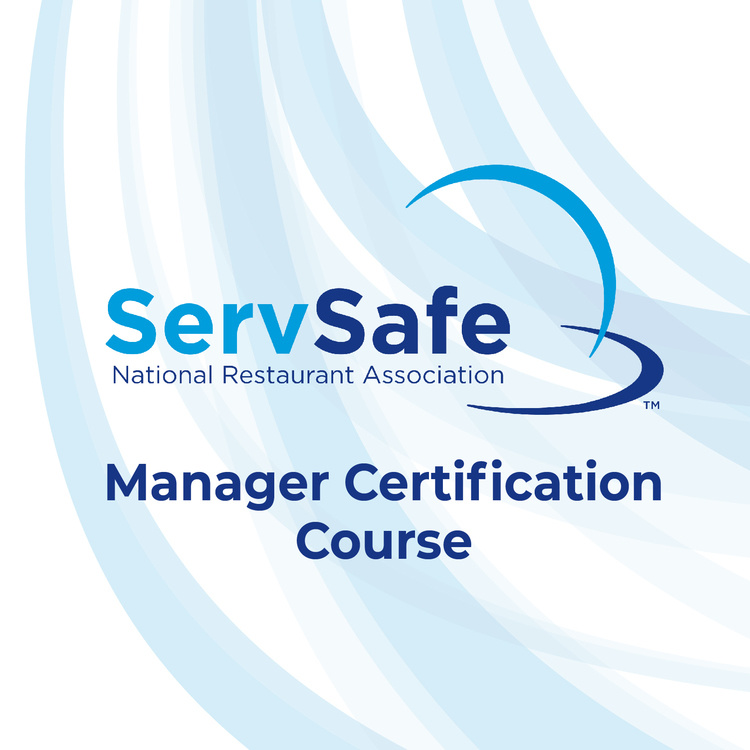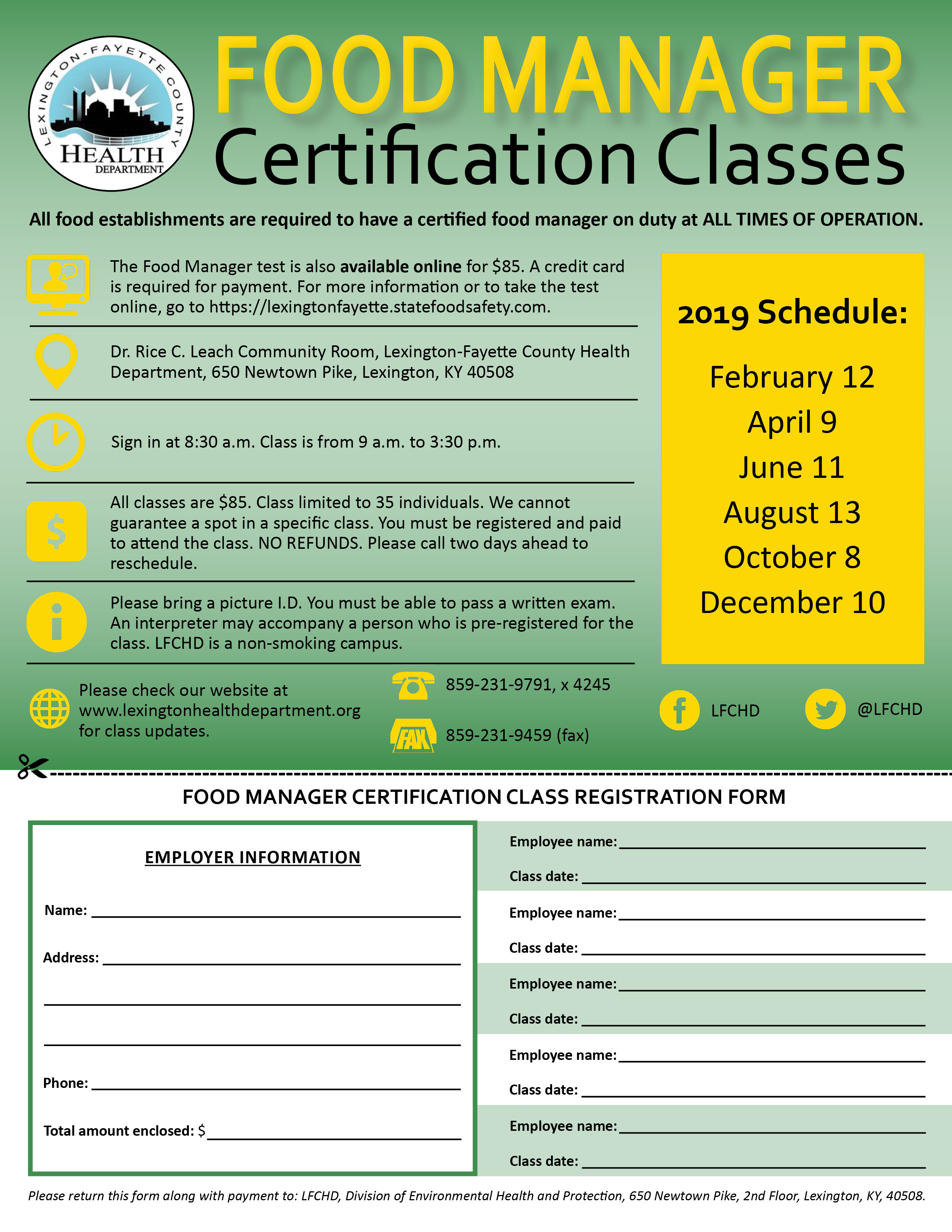How to Train Your Personnel for ServSafe Manager Certification and Enhance Procedures
How to Train Your Personnel for ServSafe Manager Certification and Enhance Procedures
Blog Article
Specialist Training for Food Manager Qualification Made Simple
The relevance of food supervisor certification can not be underrated, especially in an age where food safety is paramount. Professional training programs have actually evolved to simplify the qualification procedure, supplying necessary expertise and practical skills essential for effective food administration. These programs cover important subjects, from foodborne ailment avoidance to conformity with health and wellness regulations. Nonetheless, real worth of this training extends past simple certification; it has extensive effects for occupation improvement and public wellness. Understanding just how these components interconnect may disclose chances that are frequently ignored.
Significance of Food Supervisor Qualification
The value of Food Manager Qualification can not be overemphasized in today's food solution sector. This accreditation indicates that food managers have the important expertise and abilities to guarantee food safety and security, maintain wellness standards, and maintain regulatory conformity. In a period where foodborne diseases can have serious consequences, the role of a licensed food manager ends up being vital in securing public health.
Food Manager Accreditation not only furnishes individuals with the expertise to minimize and recognize food safety and security threats however additionally improves the trustworthiness of the establishment. Customers are progressively critical; they look for assurance that their eating experience is secure and hygienic. Accreditation works as a mark of professionalism and reliability that can bring in and keep consumers.
Moreover, lots of states and local territories mandate that establishments use certified food supervisors to follow health and wellness policies. This requirement emphasizes the accreditation's significance in preventing possible legal implications and fines. In addition, a certified food supervisor can lead personnel training, promoting a society of safety and liability within the office. Purchasing Food Manager Accreditation is a financial investment in quality, safety and security, and the overall success of food service operations.
Review of Professional Training Programs
Expert training programs for food manager certification are made to provide thorough education and learning on food security methods, regulatory conformity, and danger management. These programs aim to furnish food solution experts with the understanding and abilities needed to make certain secure food handling and prep work in numerous setups, including restaurants, providing services, and institutional food operations.
Normally, professional training programs incorporate both academic and practical components, allowing participants to involve with real-world situations. The curriculum often consists of crucial subjects such as foodborne ailments, proper food storage space techniques, cleanliness procedures, and employee training techniques. These programs are often upgraded to straighten with the latest industry standards and policies, making certain that participants get pertinent and present details.
Many programs supply adaptable delivery methods, including in-person classes, online training courses, or a hybrid technique, accommodating various knowing preferences and schedules. Upon effective conclusion, participants generally receive qualification, which is often recognized by regional health divisions and regulatory firms, improving their occupation potential customers within the food service market. Generally, professional training programs play an essential role in fostering a society of food safety and security and conformity amongst food managers and personnel.
Secret Subjects Covered in Training
Food safety and security is an important emphasis in food supervisor accreditation training, encompassing a range of necessary subjects that guarantee participants are fully equipped to take care of food safely. Among the key topics covered is the significance of personal health, which includes appropriate handwashing techniques and the relevance of maintaining cleanliness in cooking locations.
Additionally, the training addresses foodborne health problems, detailing the different microorganisms that can infect food and the signs and symptoms linked with these illnesses. Individuals learn concerning the problems that advertise microbial development, which is important for preventing outbreaks.
Temperature control is another vital topic, highlighting the secure food preparation, cooling, and storage temperatures essential to decrease dangers. The training likewise covers cross-contamination prevention techniques, guaranteeing that raw and cooked foods are dealt with suitably to prevent hazardous interactions.
Additionally, food safety regulations and standards, such as those set forth by the FDA and neighborhood wellness departments, are talked about to give a discover this detailed understanding of compliance demands. Efficient pest control measures are taken a look at to protect food establishments from problems that can jeopardize security. Collectively, these topics lay a solid foundation for risk-free food administration methods.
Advantages of Specialist Training
How can expert training enhance food security practices within a facility? Expert training equips food managers with detailed knowledge of food security laws, sector requirements, and finest practices. This foundational understanding is vital for maintaining a tidy and safe cooking setting, eventually minimizing the danger of foodborne ailments.
In addition, expert training cultivates a proactive method to food security by stressing preventive steps and hazard analysis. Supervisors trained by market professionals can effectively recognize prospective dangers and carry out methods to minimize them. This not just protects clients but likewise enhances the facility's track record and trustworthiness.
In addition, specialist training motivates a society of continual enhancement. Food managers that involve in ongoing education and learning are much better prepared to adapt you can try these out to new laws and patterns in the food solution market. This adaptability can bring about enhanced functional efficiency and price savings.


Actions to Accomplish Accreditation
Attaining accreditation in food management requires a methodical technique that encompasses numerous vital steps. Individuals have to choose an approved training program that provides extensive coursework in food hygiene, security, and monitoring principles - Manager Certification Training. These programs usually supply important resources, consisting of research materials and technique exams
Next, candidates must proactively take part in the training sessions, whether on the internet or in-person, to boost their understanding of important subjects such as foodborne health problems, personal health, and correct food storage strategies. Participation in discussions and useful workouts can better reinforce discovering.

Once adequately prepared, candidates can arrange and take the examination. Successful completion generally requires attaining a certain passing score, which shows a detailed understanding of food safety and security requirements.
Final Thought
In summary, expert training for food supervisor certification plays a crucial role in ensuring food safety and security and compliance with regulatory criteria. The structured programs offer vital expertise and sensible abilities essential for managing foodborne illnesses and sanitation methods efficiently. By helping with access and enhancing profession potential customers, these training efforts add substantially to public health. Inevitably, achieving food supervisor certification through expert training not just raises individual expertises but additionally fosters a safer food environment for all.

Expert training outfits food managers with comprehensive understanding of food security policies, market criteria, and finest methods.In recap, professional training for food manager qualification plays an important role in ensuring food security and conformity with regulatory requirements (Safe Serve Manager). Eventually, achieving food manager accreditation through specialist training not only raises individual expertises but additionally cultivates a much safer food setting for all
Report this page